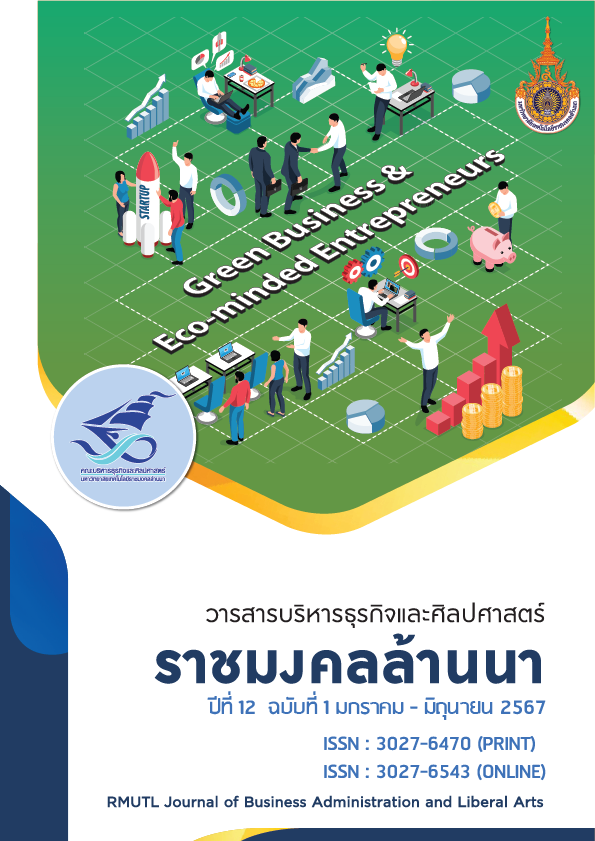Guidelines for Developing Agrotourism at Doi Pu Muen, Mae Sao Subdistrict, Mae Ai District, Chiang Mai Province
Main Article Content
Abstract
Research on guidelines for developing agrotourism at Doi Pu Muen, Mae Sao Subdistrict, Mae Ai District, Chiang Mai Province the objectives are to 1) study the potential of Doi Pu Muen agrotourism. 2) to find ways to develop the potential of Doi Pu Muen agrotourism. sample group Used in the research are: 1) a group of 10 homestay members; 2) a group of 10 people from the Doi Pu Muen agrotourism group; and 3) a group of 10 farmers who expressed their desire to join the project. Selecting a specific sample by purposive sampling technique and a unique sample, totaling 30 people. Research tools include a survey form, in-depth interview and participation in observation, the research team used content analysis methods. Present information using descriptive methods. The data obtained from the interviews used an inductive analysis method. By taking the data, compiling it, and classifying it systematically.
The results of the research found that the potential of the Doi Pu Muen agrotourism community in Mae Sao Subdistrict, Mae Ai District, Chiang Mai Province was at a very good level (74.42 %). When considering each aspect, it was found that the potential for attracting agrotourism attractions is at an excellent level (81.25 %), followed by the supporting potential of agrotourism destinations. It is at a very good level (80.77 %) in terms of the management potential of agrotourism destinations. It is at a very good level (72.22 %) in terms of the market management potential of agrotourism destinations. is at a good level (68.75 %), and the service potential of agrotourism destinations is at a moderate level (60.00 %). As for the guidelines for developing the potential of the Doi Pu Muen agrotourism group, marketing development should be a first priority. They must give importance to surveys, research or find more information on agrotourism marketing. Including creating a tourism network in the form of marketing activities with partners related to tourism in Chiang Mai Province. This will lead to publicizing activities or issues related to community agrotourism attractions. That are unique or have an attractive identity. Then organize activities to increase the potential of tourist attraction management, especially the management of human resources that will take care of tourists. both information services agricultural knowledge product and room service Including sending and receiving tourists to make tourists impressed and come back to travel again.
Article Details

This work is licensed under a Creative Commons Attribution-NonCommercial-NoDerivatives 4.0 International License.
บทความวิจัยนี้เป็นของลิขสิทธิ์
References
กรมการท่องเที่ยว. (2557). คู่มือการตรวจประเมินมาตรฐานคุณภาพแหล่งท่องเที่ยวเชิงเกษตร. (พิมพ์ครั้งที่ 2). สำนักงานกิจการโรงพิมพ์องค์การสงเคราะห์ทหารผ่านศึกในพระบรมราชูปถัมภ์.
กองเศรษฐกิจการท่องเที่ยวและกีฬา. (2560). รายงานภาวะเศรษฐกิจท่องเที่ยว. (ออนไลน์). จาก https://www.mots.go.th/ewt_dl_link.php?nid=8404
เกษราพร ทิราวงศ์ และอำนวยพร ใหญ่ยิ่ง. (2554). การศึกษาการพัฒนาศักยภาพชุมชนบ้านแม่แรม ตำบลเตาปูน อำเภอสอง จังหวัดแพร่ ด้วยการท่องเที่ยวเชิงนิเวศเพื่อสร้างความเข้มแข็งของชุมชนอย่างยั่งยืน. รายงานผลการวิจัยมหาวิทยาลัยแม่โจ้. เชียงใหม่: มหาวิทยาลัยแม่โจ้.
จิระวัฒน์ อนุวิชชานนท์ และศิริวรรณ เสรีรัตน์. (2555). การบริหารการโฆษณาและการสื่อสาร การตลาดแบบบูรณาการ. นนทบุรี: ธรรมสาร
ดรุณ ไกรศรี. (2554). แนวคิดและทฤษฏีศักยภาพของบุคคล. จุลสารการท่องเที่ยว: กรุงเทพมหานคร.
นันทิยา หุตานุวัตร. (2546). SWOT การวางแผนกลยุทธ์ธุรกิจชุมชน: คณะเกษตรศาสตร์ มหาวิทยาลัยอุบลราชธานี สถาบันชุมชนท้องถิ่นพัฒนา. (ออนไลน์). จาก http://www.jit-jai-.blogspot.com/2007/08/swot. html
นาฏสุดา เซมนะสิริ. (2555). การพัฒนาแหล่งท่องเที่ยวเชิงเกษตร. (พิมพ์ครั้งที่ 1). กรุงเทพฯ: สาขาส่งเสริมและธุรกิจเกษตร คณะเกษตรและชีวภาพ มหาวิทยาลัยราชภัฏจันทรเกษม.
นิออน ศรีสมยง. (2552). แนวทางการพัฒนาแหล่งท่องเที่ยวเชิงเกษตรอย่างยั่งยืน กรณีศึกษา อำเภอวังน้ำเขียว จังหวัดนครราชสีมา. นครราชสีมา: มหาวิทยาลัยเกษตรศาสตร์.
ราณี อิสิชัยกุล. (2556). แนวคิดเกี่ยวกับการจัดการการท่องเที่ยวเชิงเกษตร. เอกสารการสอนชุดวิชาการ
วรรณวิมล ภู่นาค. (2558). ศักยภาพชุมชนในการจัดการท่องเที่ยวโดยชุมชน: กรณีศึกษาตลาดน้ำอัมพวา. วารสารวิทยบริการ มหาวิทยาลัยสงขลานครินทร์, 26(1), 63-74.
วิวัฒน์ชัย บุญยภักดิ์. (2536). สรุปปัญหาและการป้องกันแก้ไขผลกระทบของการท่องเที่ยวต่อสิ่งแวดล้อม. กรุงเทพมหานคร. จัดการการท่องเที่ยวเชิงเกษตร หน่วยที่ 1-7. นนทบุรีมหาวิทยาลัยสุโขทัยธรรมาธิราช
สถาบันวิจัยวิทยาศาสตร์และเทคโนโลยีแห่งประเทศไทย. (2543). การศึกษาเพื่อกำหนดแนวทางการพัฒนา และการจัดการการท่องเที่ยวเชิงเกษตรกรรม. กรุงเทพฯ : ศูนย์บริการวิชาการ สถาบันวิจัยวิทยาศาสตร์และเทคโนโลยีแห่งประเทศไทย.
สำนักพัฒนาแหล่งท่องเที่ยว กรมการท่องเที่ยว. (2557). คู่มือการประเมินมาตรฐานคุณภาพแหล่งท่องเที่ยวเชิงเกษตร. กรุงเทพมหานคร.
อดิเทพ ครุฑธามาศ. (2562). ศักยภาพการท่องเที่ยวโดยชุมชนพื้นที่ภาคใต้ของประเทศไทย. การจัดการประชุมวิชาการเสนอผลงานวิจัยระดับชาติด้านวิทยาศาสตร์และเทคโนโลยี มหาวิทยาลัยราชภัฏจันทรเกษม ครั้งที่ 2 ประจำปีการศึกษา 2561. คณะวิทยาศาสตร์ มหาวิทยาลัยราชภัฏจันทรเกษม. วันที่ 6 มิถุนายน. 306.
องค์การบริหารการพัฒนาพื้นที่พิเศษเพื่อการท่องเที่ยวอย่างยั่งยืน. (2553). การท่องเที่ยวโดยชุมชน (COMMUNITY - BASED TOURISM). (ออนไลน์). จาก http://www.dasta.or.th/th/%E0%B8%82%E0%B9%89%E0%B8%AD%E0%B8%9A%E0%B8%B1%E0%B8%87%E0%B8%84%E0%B8%B1%E0%B8%9A%E0%B8%AD%E0%B8%9E%E0%B8%97/item/674-674
Berry, L., & Parauraman, A., (1991). Perceived Service Quality as a Customer-Based Performance Measure: An Empirical Examination of Organizational Barriers Using an Extended Service Quality Model. Human Resource Management, 30(3), 335-364.
Gronroos, C.. (1990). Service Management and Marketing: Managing the Moments of Truth Service Competition. Lexington, MA: Lexington Books.

